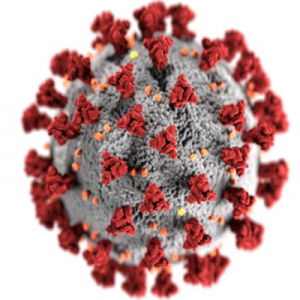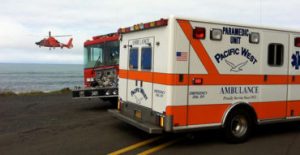2020-2021 Instructional Plan
Introduction
The following Instructional Plan was approved by the OCCC Board of Education at its regular meeting on Wednesday, Aug. 19, 2020. Updated 1.12.2021.
The document (last updated 9.16.20) summarizes Oregon Coast’s plan to deliver instruction safely and responsibly for the Fall 2020 term; the living document applies to the Winter 2021 and beyond, and it will be revised as necessary as circumstances warrant. The document details the College’s practices in all aspects of protecting the health of students and employees, while ensuring the rigor and accessibility of instruction.
Regarding personal protective equipment (PPE), specifically face coverings, the document includes the following:
“Use of face coverings, face shields, barriers, etc. is required in all public areas of College buildings (campus and centers), as well as all classroom and laboratory settings. Exceptions to the face-covering requirement are requested through Student Services and Human Resources, as appropriate. In common areas, when small groups of students or staff may gather for study sessions or to share a meal, signage on site will indicate protocols in place. Employees and students will be encouraged to provide their own face coverings, but single-use face coverings will be available at the front entrance to all College buildings when individuals do not have their own face coverings. Face shields will be available on a limited basis for those employees and students who request them.”
Contents
- Applicability of OHA Standards
- Guiding Principles
- Key Principles of OHA Standards
- Standards: General Requirements
- Entry and Self-Screening
- Hand Hygiene and Respiratory Etiquette
- Health-Related Communication
- Isolation Measures
- General Facilities
- Instructional Activities
- Career and Technical Education Instruction
- Health Profession Instruction and Assessment
- Disease Management Plan (Draft)
- COVID-19 Health & Safety Operational Plan
- Resources
- OCCC Statement of Non-Discrimination
Applicability of Oregon Health Authority Standards
Oregon Coast Community College crafted its reopening framework based on OHA standards which apply to public universities listed in Oregon Revised Statute (ORS) 352.002, community colleges operated under ORS chapter 341, and degree-granting private colleges and universities that operate in Oregon. We adhere to all of the Governor’s Executive Orders, with particular attention to those specific to Higher Education (EO 20-09, 20-17, 20-28).
Back to Contents
Oregon Coast Community College’s Guiding Principles for Pandemic Response
Oregon Coast Community College seeks to re-open to meet the College’s mission of equipping students for success by providing educational pathways and supports in response to the diverse needs of our community. Through accessible and engaging programs, we enrich the economic and civic vitality of Lincoln County and beyond.
Therefore, we embrace the following guiding principles for re-opening:
-
- Prioritize, above all else, the health and safety of students, employees and the community.
- Develop re-opening strategies that follow the Governor’s executive orders, Oregon Health Authority, Higher Education Coordinating Commission (HECC), Centers for Disease Control and Prevention (CDC) guidelines, and that follow recommendations of other accrediting bodies.
- Use available evidence and data as the basis for our decisions and directives.
Back to Contents
Key Principles of OHA Standards
Reducing potential exposures
The mainstays of reducing exposures to the coronavirus and other respiratory pathogens are:
-
- Physical distancing — minimizing close contact (less than six feet) with other people and use of face coverings or face shields in all public areas, including classrooms. In the classroom setting, we will establish a minimum of 35 square feet per person when determining room capacity, calculated based only on usable classroom space. In-person classroom instruction shall not exceed 50 persons, or greater than 25 persons at any time Lincoln County is in Baseline or in Phase I, and groups of 10 outside the classroom.
- Hand hygiene — frequent washing with soap and water or using hand sanitizer (which will be provided at the main entrance as well as throughout all College buildings). Encourage students and employees to perform appropriate hand hygiene upon their arrival to campus every day: washing with soap and water for 20 seconds or using an alcohol-based hand sanitizer with 60-95% alcohol.
- Protective equipment — Use of face coverings, face shields, barriers, etc. is required in all public areas of College buildings(campus and centers), as well as all classroom and laboratory settings. Exceptions to the face-covering requirement are requested through Student Services and Human Resources, as appropriate. In common areas, when small groups of students or staff may gather for study sessions or to share a meal, signage on site will indicate protocols in place. Employees and students will be encouraged to provide their own face coverings, but single-use face coverings will be available at the front entrance to all College buildings when individuals do not have their own face coverings. Face shields will be available on a limited basis for those employees and students who request them. Valve masks are not accepted as suitable face coverings for College facilities, and may not be worn. The face coverings requirement is designed to help protect employees and students, and while valve masks provide protection to the wearer, they do not provide protection to those they are around, as exhalation is released into the air.
- Environmental cleaning and disinfection — especially of high-touch surfaces (refer to section on general facilities).
- In the Event of Exposure — Isolation of those who are sick and quarantine of those who have been exposed: see guidelines for employees and students for specific steps (refer to employee and student sections).
- Outdoors — With the above considerations foremost, outdoor activities are safer than indoor activities.
Should Oregon Coast Community College make the determination that all students may return for face-to-face instruction, the resumption of on-site operations must be informed by local circumstances and regional readiness, in consultation with the Lincoln County Health and Human Services (LCHHS).
The College shall provide the greatest level of choice and flexibility to equitably support student access and success in their education while minimizing risks to students and staff.
Back to Contents
Standards: General Requirements
The College shall:
- Follow Oregon Health Authority’s (OHA) General Guidance for Employers on COVID-19.
- Ensure that students, employees, and other community members will be required to follow OHA’s COVID-19 Guidance and Centers for Disease Control and Prevention (CDC) public guidance on COVID-19 when on Oregon Coast Community College property.
- Implement measures to limit the spread of COVID-19 within buildings and the campus setting, such as appropriate cleaning and disinfecting procedures; encouraging self-screening and self-monitoring for illness among students and employees; and use of face coverings or face shields, as more fully described in this document.
- Provide remote instruction/telework or make other reasonable accommodations for students and employees who are at higher risk for severe illness from COVID-19 including those with any of the following characteristics:
- People 65 years and older;
- People with chronic lung disease (other than mild asthma);
- People who have serious heart conditions;
- People who are immunocompromised;
- People with obesity (body mass index [BMI] of 30 or higher);
- People with diabetes;
- People with chronic kidney disease undergoing dialysis;
- People with liver disease; and
- Any other medical conditions identified by OHA, CDC, or a licensed health care provider.
- Ensure the use of face coverings, or face shields, by all students and employees, in accordance with local public health, OHA, and CDC guidelines.
- Require the use of face coverings, or face shields, in settings where six feet of physical distance between people is difficult to maintain.
- The college store, “Your College Store,” will be open for book purchases only for fall term and will follow relevant OHA guidance. Opening of the college store for food purchases is still under consideration and, should such sales resume, OHA guidance will be followed.
- OCCC will work with the Lincoln County Health and Human Services (LCHHS) to ensure effective response to outbreaks through sharing of information when appropriate.
Back to Contents
Entry and Self-Screening
The College shall:
- Open campus spaces and buildings for official college business.
- Ensure that campus spaces and buildings are not open to the general public.
- Allow campus use for authorized community programs and activities that lack alternative venues and do not tax College resources or distract from our ability to attend to our core mission, and provided the activities or programs adhere to College safety rubrics.
- Encourage students and employees to perform appropriate hand hygiene upon their arrival to campus every day: washing with soap and water for 20 seconds or using an alcohol-based hand sanitizer with 60-95% alcohol.
- Require students and employees to conduct a self-check for COVID-19 symptoms before coming to a campus.
- Instruct students and employees to stay home if they have COVID-19 symptoms. COVID-19 symptoms are as follows:
- Primary symptoms of concern: cough, fever or chills, shortness of breath, or difficulty breathing.
- Muscle pain, headache, sore throat, new loss of taste or smell, diarrhea, nausea, vomiting, nasal congestion, and runny nose are also symptoms often associated with COVID-19 but are non-specific.
- More information about COVID-19 symptoms is available from CDC here. (https://www.cdc.gov/coronavirus/2019-ncov/symptoms-testing/symptoms.html)
- Emergency signs and symptoms that require immediate medical attention:
- Trouble breathing
- Persistent pain or pressure in the chest
- New confusion or inability to awaken
- Bluish lips or face
- Other severe symptoms
- Instruct all employees, or students who have a chronic or baseline cough that has worsened or is not well-controlled with medication, to stay at their place of residence.
- Ensure that those who have other symptoms that are chronic, or baseline symptoms, are not restricted.
Back to Contents
Hand Hygiene and Respiratory Etiquette
The College shall:
- Use signage and other communications to remind students and employees about the utmost importance of hand hygiene and respiratory etiquette. Signage will be placed in high-visibility areas (such as mirrors in bathrooms) and on monitors located in common areas.
- Hand hygiene means washing with soap and water for 20 seconds or using an alcohol-based hand sanitizer with 60-95% alcohol.
- Respiratory etiquette means covering coughs and sneezes with an elbow or a tissue, especially when not wearing a face covering. Tissues should be disposed of, and hands washed or sanitized, immediately.
- Provide hand hygiene stations with alcohol-based hand sanitizer in high-use areas, such as entrances to buildings and other areas, as feasible. Strongly encourage students and employees to use hand sanitizer on entry and exit to each room.
Health-Related Communication
The College will:
- Advise employees that working while ill is not permitted.
- Ensure that employees remain current on health trainings. They should anticipate additional training related to increased precautions and updated protocols.
- OCCC’s Human Resource Manager will collaborate with health professionals to provide evidence-based education.
- Advise students and employees to stay at their place of residence if they or anyone in their household have recently had an illness with COVID-19 symptoms. See “Entry and self-screening,” above.
- Advise and encourage all people on campus to wash their hands frequently. Alcohol-based hand sanitizing products may be used an alternative to hand-washing, except before eating, preparing or serving food, and after using the restroom. Alcohol-based products will be provided at the entrance to the College’s buildings and through the public areas. Alcohol wipes will be provided to employees for cleaning of office spaces.
- Provide ongoing training to custodial staff on cleaning protocols and COVID-19 safety requirements.
- Share with all students and employees, at the start of in-person instruction, documentation explaining infection control measures that are being implemented to prevent spread of disease.
- In accordance with LCHHS guidance, protocols have been developed for communicating with students and employees who have come into close/sustained contact with a person with COVID-19.
- With LCHHS guidance, protocols have been developed for communicating immediately with students and employees, and the community when a new case or cases of COVID-19 are diagnosed in students and employees, including a description of how the College is responding.
- Work with community partners to provide signage, trainings, protocols, informational letters and other communications in languages and formats accessible to our campus community.
Back to Contents
Isolation Measures
The College shall take steps to ensure that if a student or employee develops or reports primary COVID-19 symptoms while on campus:
- The person should immediately return to their place of residence, or isolate in a designated isolation area, until they can safely return to their residence or be transported to a healthcare facility.
- The person should seek medical care and COVID-19 testing from their regular healthcare provider or through the Lincoln County Public Health. They should follow instructions from Lincoln County Public Health regarding isolation.
- If the person has a positive COVID-19 viral (PCR) test, they should remain to their place of residence for at least 10 days after illness onset and 24 hours after fever is gone, without use of fever reducing medicine, and other symptoms are improving.
- If the person has a negative viral test (and if they have multiple tests, all tests are negative), they should remain at their place of residence until 24 hours after fever is gone, without use of fever reducing medicine, and other symptoms are improving.
- If the person does not undergo COVID-19 testing, the person should remain at their place of residence until 24 hours after fever is gone, without use of fever reducing medicine, and other symptoms are improving.
- Any employee, or student known to have been exposed (e.g., by a household member) to COVID-19 within the preceding 14 days should stay in their place of residence and follow instructions from Lincoln County Health and Human Services, or their medical provider.
Isolation Measures: Employees
Case-by-Case Evaluation
The following is a general guide implemented by the College. Each reported case may differ based on level of known or assumed contact, date of primary contact, and other health-risk factors. As positive cases are reported, the Coronavirus Response Team (CVRT) and Executive Team (ET) will continue to confer with county health officials on actions to best protect the health of our students, staff, and community.
No in-person contact (employee working remote)
Employee-report of suspected contraction (no confirmed test)
-
- Notification to supervisor and/or HR depending upon comfort level.
- Supervisor will inform HR
- HR will inform Supervisor
- Advise employee to keep supervisor and/or HR updated. As with any medical situation an employee may choose to not have detailed information shared with their supervisor. HR will ensure that information remains as confidential as possible, should confidentiality not be able to be maintained, HR will notify the employee.
- HR will follow up with employee on details around general status, job related protections
(E-PSL/E-FMLA/FMLA/OFLA) along with remote work and leave time options to minimize any incentives to work while ill.
- Notification to supervisor and/or HR depending upon comfort level.
Employee-report of symptoms and self-report of a test
-
- Advise employee to keep supervisor and/or HR updated. As with any medical situation an employee may choose to not have detailed information shared with their supervisor. HR will ensure that information remains as confidential as possible, should confidentiality not be able to be maintained, HR will notify the employee.
- Employee reminded to comply with home-quarantine until test results are known as advised by health official.
- HR will follow up with employee on details around general status, job related protections
(E-PSL/ E-FMLA/FMLA/OFLA) along with remote work and leave time options to minimize any incentives to work while ill. - HR will inform supervisor of employee work status.
Employee report of positive test
-
- Advise employee to keep supervisor and/or HR updated. As with any medical situation an employee may choose to not have detailed information shared with their supervisor. HR will ensure that information remains as confidential as possible, should confidentiality not be able to be maintained, HR will notify the employee.
- Employee reminded to comply with home-quarantine as advised by health official.
- HR will follow up with employee on details around general status, job related protections
(E-PLS/E-FMLA/FMLA/OFLA) along with remote work and leave time options to minimize any incentives to work while ill. - HR will inform the supervisor of the employee that the employee is unable to come to work along with current work status.
County-confirmed positive test/contact tracing
-
- Registrar/HR will determine if any release of information is warranted to assist with contact tracing. (Registrar consults FERPA guidance)
In-person contact
Employee working on site: self-report of suspected contraction (no confirmed test)
-
- Notification to supervisor and/or HR depending upon comfort level.
- Supervisor will inform HR
-
- Advise employee to keep supervisor and/or HR updated. As with any medical situation an employee may choose to not have detailed information shared with your supervisor. HR will ensure that information remains as confidential as possible, should confidentiality not be able to be maintained, HR will notify the employee.
- Employee reminded to comply with home-quarantine until test results are known as advised by health official.
- HR will follow up with employee on details around general status, job related protections
(E-PLS/E-FMLA/FMLA/OFLA) along with remote work and leave time options to minimize any incentives to work while ill. - HR will inform the supervisor of employee that the employee is unable to come to work along with current work status.
- Registrar/HR will determine if any release of information is warranted.
Facilities protocols
-
- Continuous standard cleaning protocol in open areas
- Employee/Supervisor may request facilities clean office spaces
- Employee advised to clean offices following student/co-worker meetings.
- Necessary supplies available from Facilities
Self-report of positive test
Employee protocols
-
- Advise employee to keep supervisor and/or HR updated. As with any medical situation an employee may choose to not have detailed information shared with their supervisor. HR will ensure that information remains as confidential as possible, should confidentiality not be able to be maintained, HR will notify the employee.
- Employee reminded to comply with home-quarantine requirements as advised by health official.
- HR will inform supervisor of employee that they are unable to come to work along with current work status.
- HR will follow up with employee on details around general status, applicable job-related protections
(E-PLS/E-FMLA/FMLA/OFLA) along with remote work and leave time options. - HR will inform supervisor of employee that they are unable to come to work along with current work status.
- Registrar/HR will determine if any release of information is warranted.
Facilities protocols
-
- Continuous standard cleaning protocol in open areas.
- Supervisor will request facilities clean office and classroom used – closed for 24 hours.
- Continue standard cleaning protocol in open areas.
- Staff request facilities clean office spaces.
County-confirmed positive test/contact tracing: Same for Students & Employees
-
- CVRT and ET will notify county health officials.
- Registrar coordinates release of contact/information as legally necessary for contact tracing.
- Facilities will continue standard cleaning protocol in public areas.
- Request facilities clean office spaces based on notification of a positive case (no mention of individual).
- Clery Notification
- Send Clery notification (duty to warn) within 24 hours (Responsible: Chris Rogers, Joy Gutknecht).
- Recipients depend on potential exposure (all staff, all students, only those in specific location)
- Message must be approved by College President.
Isolation Measures: Students
Case-by-Case Evaluation
The following is a general guide implemented by the College. Each reported case may differ based on level of known or assumed contact, date of primary contact, and other health-risk factors. As positive cases are reported, CVRT and ET will continue to confer with county health officials on actions to best protect the health of our students, staff, and community.
No in-person contact (student)
Self-report of suspected contraction (no confirmed test)
-
- No notification needed.
- Advise student to keep College updated. As with any medical situation staff/faculty may follow up with individual regarding future class participation.
Self-report of symptoms and self-report of a test (student)
-
- As with any medical situation, a student (without disclosing the nature of the illness) will be advised to work with individual instructors.
- Student reminded to comply with home-quarantine until test results are known as advised by health official.
- Instructor will inform student that the Vice President of Student Affairs will be informed (for further follow up/coordination with other instructors).
- Instructor will notify the Vice President of Student Affairs for appropriate outreach to individual (following up on offers of academic/student services support).
Self-report of positive test (student)
-
- As with any medical situation, a student (without disclosing the nature of the illness) will be advised to work with individual instructors.
- Instructor will inform student that the Vice President of Student Affairs will be informed (for further follow up/coordination with other instructors).
- Instructor will notify the Vice President of Student Affairs for appropriate outreach to individual (following up on offers of academic/student services support).
- In the event student does not respond, no further action.
- County-confirmed positive test/contact tracing
- Registrar/HR to determine if any release of information is warranted to assist with contact tracing. (Registrar consults FERPA guidance)
In-person contact (including potential in-person contact)
Self-report of suspected contraction (no confirmed test)
-
- Continue standard cleaning protocol in open areas.
- Staff should request facilities clean office spaces.
Self-report of positive test
-
- Student is asked to leave the building and contact the county, and to follow the advice of their medical provider and public health guidelines.
- Student is asked to contact Office of Student Affairs from home, via telephone or email.
- Continue standard cleaning protocol in open areas.
- Staff have been advised to clean offices following student meetings.
- Staff may request facilities clean office spaces.
County-confirmed positive test/contact tracing
-
- CVRT and ET will confer with county health officials on next steps.
- Registrar coordinates release of contact/information as legally necessary for contact tracing.
- Facilities will continue standard cleaning protocol in open areas.
- Request facilities clean office spaces based on notification of a positive case (no mention of individual).
- Communication
- Send Clery notification (duty to warn) within 24 hours (Responsible Managers: Chris Rogers, Joy Gutknecht).
- Recipients depend on potential exposure (all staff, all students, only those in specific location).
- Message must be approved by College President.
Back to Contents
General Facilities
The College shall:
Clean and disinfect facilities frequently, generally at least daily when there is activity, to prevent transmission of the virus from surfaces. CDC provides guidance on disinfecting public spaces. See CDC’s “Reopening Guidance for Cleaning and Disinfecting Public Spaces, Workplaces, Businesses, Schools, and Homes” (https://www.cdc.gov/coronavirus/2019-ncov/community/reopen-guidance.html)
- Common areas and entryways will be cleaned multiple times during operating hours. 70% isopropyl alcohol will be used on all door handles, push bars, handrails, vending machines, elevator call buttons, tabletops and keyboards.
- Classrooms will be cleaned after every use. Chairs, tables, podiums and door handles will be wiped down with 70% isopropyl. If a classroom does not have another class scheduled after its use, the room will either be cleaned immediately and then secured, or it will be locked for the night and cleaned before operating hours.
- Employees’ offices will be cleaned upon request. Generally, employees are responsible for their work areas. If an employee meets with a suspected or confirmed person with COVID-19, the room shall be immediately secured until custodial staff can safely clean the room. This cleaning will require an N95 mask and gloves.
- Where possible, exhaust fans will be turned off to allow for positive pressure to build in the building. Employees will be encouraged to open windows to allow the air to quickly flow out.
- Air handlers will be programmed to run 24/7 to keep air circulated and fresh.
Back to Contents
Instructional Activities
General Instruction
For all general instruction offered for courses that lead to a certificate or degree, the College shall:
- Ensure that all lecture classes, including the lecture portion of lab classes, will be delivered remotely using Zoom, with the following exceptions:
- Some sections of Developmental and College Success courses are approved for face-to-face instruction within the parameters specified below. These courses were determined based on high D, F, W rates from Spring 2020 Remote Delivery.
- Some sections of English for Speakers of Other Languages are approved for face-to-face instruction within the parameters specified below. These courses were determined based on low student participation rates from Spring 2020 Remote Delivery.
- Some sections of Health Care and other Career and Technical Education courses where hands-on activities or scenarios are required for the mastery of course competencies are approved for face to face instruction when that content is integrated into the lecture, subject to the parameters specified below.
- Establish a minimum of 35 square feet per person when determining room capacity, calculated based only on usable classroom space. In-person classroom instruction shall not exceed 50 persons, or greater than 25 persons should Lincoln County be placed in Baseline or in Phase I. (Lincoln County is in Phase 1 as of the time of this writing.)
- Modify the physical layout of classrooms to permit students to maintain at least six feet of distance between one another and the instructor(s). This may include changes to traffic flow, desk or chair arrangements, or maximum capacity.
- Ensure that chairs and desks are removed from classrooms to provide 35 square feet per person, to maintain six feet of distance between students and between students and the instructor. If chairs and/or desks are fixed in place, chairs will be blocked off to ensure physical distancing requirements.
- In some laboratory settings, skill development will require interactions between students and instructors at distances less than six feet, including limited physical contact to correct hand or body positioning. Such contact will occur only when instructionally necessary, and only when the student and instructor are wearing both face and hand coverings appropriate to the instructional setting.
- Utilize markings and/or signage to indicate physical distancing requirements within instructional settings.
- Require that all individuals across all OCCC locations or in locations where OCCC credit and/or non-credit instruction occurs wear face coverings or face shields except when alone in an office (see “Protective Equipment,” above – or P. 4 in PDF version.)
- Post signage indicating physical distancing and mandatory face covering requirements in public spaces will be outside of each classroom. Students or employees with a medical condition that precludes the wearing of a face covering can obtain an exception from Student Services/Human Resources. A face shield may be issued and worn in lieu of a mask.
- Classroom faculty can request a face shield for use in the classroom/laboratory when lecturing.
- For settings with higher risk of spread, such as laboratories, computer labs, music/performance classes, studios, and locker rooms, implement enhanced measures such as greater physical distancing, physical barriers (e.g. clear plastic), increased fresh air ventilation, moving outdoors, and enhanced cleaning measures will be implemented.
- Enhanced cleaning protocols for classrooms are in effect. This includes the cleaning (with products that meet OHA Guidelines) of all tables and chairs, laboratory counters, workbenches, computer stations, and shared equipment between each instructional session taking place in a classroom or laboratory.
- In specialized animal husbandry facilities (e.g., the Aquarium Science Building), cleaning and disinfecting will follow the protocols of the facility.
- Weather permitting, classrooms will open windows or bay doors to increase fresh-air ventilation.
- Some laboratory sessions in CTE programs (e.g., Aquarium Science, Welding) or science courses that require a high degree of collaborative student interaction may be moved outdoors to increase fresh air circulation. In such cases, students will wear the face and hand coverings appropriate for the activity and the discipline (e.g., a team of welding students might be wearing respirators, face shields, and welding gloves, while a team of AQS students may be wearing safety glasses, face covering, and latex gloves).
- Physical barriers are acceptable instead of, or in addition to, six feet or more of spacing between people. Please see OHA General Guidance for Employers on COVID-19.
Back to Contents
Career & Technical Education Instruction
For all career and technical education instruction offered for credit, in addition to the requirements above, the College shall:
- Ensure that CTE Programs for Health-Related Program follow the same protocol as established above under instruction for on campus in-person instruction as noted above.
- Ensure that, in the Health Occupations Programs, face coverings will always be required in skill lab settings since students will be working in close proximity with each other and faculty members.
Back to Contents
Health Profession Instruction & Assessment
For all instruction and assessment in fields leading to certificates and degrees in the health professions, the College shall:
For laboratory instruction or demonstration of clinical skills without physical contact, OCCC will:
- Modify the physical layout of classrooms to permit students to maintain at least six feet of distance between each other and the instructor(s). Students will be required to wear face coverings, or face shields at all time during the skills lab setting even with maintaining six feet of distance between each other and the instructor.
- Always ensure monitoring and enforcement of physical distancing requirements; and
- Perform enhanced cleaning before and after each session: the skills lab area will be cleaned by faculty in between each student use with the facility established protocol as noted in this document. Enhanced cleaning will be performed daily by facilities staff prior to the lab being used for the next session.
For standardized patient simulations or laboratory instruction in close quarters or practicing clinical skills with physical contact, OCCC Healthcare Faculty will:
- Provide mandatory instruction on infection control practices and the appropriate use of personal protective equipment (PPE) (this is part of all healthcare curriculum);
- Require use of appropriate PPE for all personnel that come within six feet of each other; and perform enhanced cleaning before and after each session. Faculty will be responsible for cleaning lab area during the day and the lab will be cleaned daily by facilities personnel using enhanced protocols.
For preceptorships and direct patient care:
- Provide mandatory instruction on infection control practices and the appropriate use of personal protective equipment (PPE) (this curriculum is presented prior to skills lab experiences and reinforced prior to clinical experiences. Healthcare partners require that student’s complete facility-based training related to PPE and COVID-19 prevention measures.
- Strictly adhere to the clinical facility’s infection control protocols; confirm that the clinical facilities have the appropriate personal protective equipment (PPE) for their students who are involved in direct patient care within those facilities. OCCC has been in contact with clinical partners and there is agreement that students will not be allowed in the clinical facilities if there is not enough PPE to meet the students’ needs.
- Conduct regular symptom monitoring of students. Faculty and students will follow the facility protocol for entrance to the healthcare facility. A similar monitoring program will be implemented for all students prior to entrance to skills lab/simulation experiences.
- Follow the facility’s occupational health protocols if exposed and/or symptoms develop, including immediate exclusion from all patient care, testing for SARS-CoV-2, and mandatory reporting to Lincoln County Public Health.
- Perform cleaning and disinfecting per the facility’s protocols.
Back to Contents
Disease Management Plan (DRAFT)
The College has a written communicable disease preparedness and response plan. As a direct result of this plan the College has protocols to:
- Notify the Lincoln County Health and Human Services (LCHHS) of any confirmed COVID-19 cases among students, and employees.
- Assist the LCHHS as needed with contact tracing.
- Isolate or quarantine any ill or exposed persons.
- Systematically disinfect classrooms, offices, bathrooms and public areas.
- Coordinate with LCHHS on contingency planning for response to a person diagnosed with COVID-19 who had been at an OCCC location.
Back to Contents
COVID-19 Health & Safety Operational Plan
Plan Development
Required
- The College has developed and will use this written operational plan, which addresses that OCCC is meeting the requirements of the Higher Education Coordinating Commission (HECC) and the Oregon Health Authority (OHA) guidance.
- The College has designated Joy Gutknecht, Human Resource Manager, to implement and enforce, or supervise the implementation or enforcement, of the standards and requirements provided in this guidance and established in the institution’s operational plan.
Required
- The College shall submit their operational plan to the Lincoln County Health and Human Services, which will review the plan and support College efforts toward ongoing COVID-19 mitigation efforts.
- The College has established that Joy Gutknecht, Human Resources Manager will be the OCCC’s main contact with the HECC and LCHHS.
Back to Contents
Resources
- Oregon local public health authority (LPHA) directory; note that “CD nurse” is the number for communicable disease issues: https://www.oregon.gov/oha/PH/DISEASESCONDITIONS/COMMUNICABLEDISEASE/REPORTINGCOMMUNICABLEDISEASE/Pages/Emergency-Rule-COVID-19.aspx
- CDC guidance on the use of face coverings: https://www.cdc.gov/coronavirus/2019-ncov/prevent-getting-sick/diy-cloth-face-coverings.html
- CDC guidance: “Reopening Guidance for Cleaning and Disinfecting Public Spaces, Workplaces, Businesses, Schools, and Homes”, https://www.cdc.gov/coronavirus/2019-ncov/community/reopen-guidance.html
- Oregon Health Authority’s (OHA) General Guidance for Employers on COVID-19.
- CDC guidance on ventilation and filtration (https://www.cdc.gov/coronavirus/2019-ncov/community/guidance-business-response.html)
- American Society of Heating, Refrigerating, and Air-Conditioning Engineers (ASHRAE) guidance on ventilation: (https://www.ashrae.org/news/ashraejournal/guidance-for-building-operationsduring-the-covid-19-pandemic)
Back to Contents
OCCC Statement of Non-Discrimination
Oregon Coast Community College does not discriminate on the basis of race, color, national origin, sex, disability, age, sexual orientation, marital status, or religion in its programs and activities. The following individuals have been designated to handle inquiries regarding the non-discrimination policies:
No discriminación
Oregon Coast Community College no discrimina base el color, raza, origen nacional, sexo, discapacidad, edad, orientación sexual, estado civil o religiosa en sus programas y actividades. Las siguientes personas han sido designadas para atender las consultas relativas a casos de discriminación:
Vice President Student Affairs
400 SE College Way
Newport, OR 97366
541-867-8511
Joy Gutknecht, HR Director
400 SE College Way
Newport, OR 97366
541-867-8515
joy.gutknecht@oregoncoast.edu
Back to Contents



